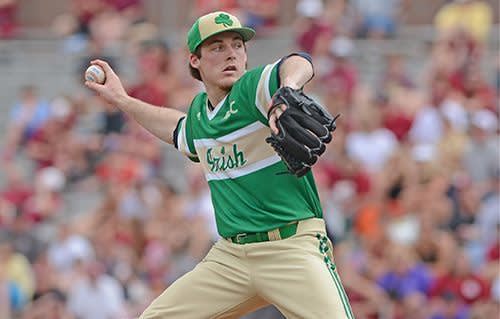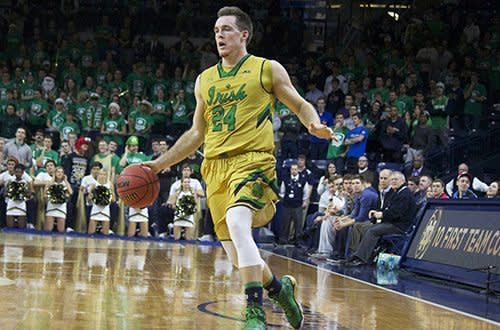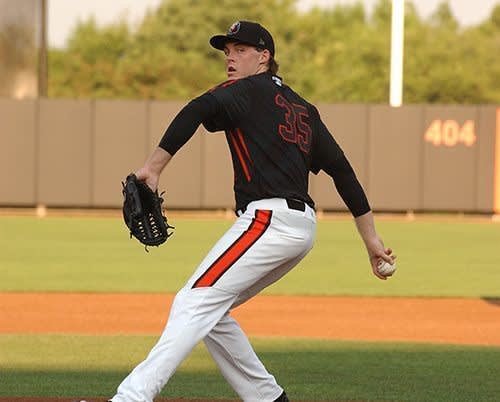
(Photo courtesy of Phil Kelly, thumbnail image above courtesy of Mike Bennett/University of Notre Dame Athletics)
When the University of Notre Dame’s men’s basketball team pulled off two upsets over Duke University and the University of North Carolina to win the ACC Tournament this year, they looked to their calm, collected team captain, Pat Connaughton, to lead the way.
A graduate of Arlington (Mass.) Little League, Connaughton was “captain clutch” and led his team to one of the best seasons in school history. The senior guard knows that even though their NCAA tournament run is over after a near-upset of overall number one-seed Kentucky on Saturday, March 28, his playing days aren’t over. A pitching prospect in the Baltimore Orioles’ organization, Connaughton is a rising star on the mound and pulled double-duty with the Fighting Irish, playing both basketball and baseball.
He spoke with Little League® about his Little League days growing up outside of Boston, the benefits of being a multi-sport athlete, and how he stayed so cool under the bright lights of the NCAA Men’s Basketball Tournament.
Little League: What was your favorite part about playing Little League growing up?
Pat Connaughton: I loved every second of playing Little League. I just had the best time. I come from a very competitive town; we all play hockey and baseball. I was really the only one playing basketball. But everything we did was competitive, from town league to all-stars.
LL: In today’s world where specialization seems to be so prevalent, how has being a multi-sport athlete helped you achieve great success in both basketball and baseball?
PC: I really believe that being a multi-sport athlete can help pretty much any person. Playing multiple sports allows athletes to develop different abilities and improve their game IQ in both sports. I also really think that it prevents injuries. If you are out there playing a single sport for 12 months out of the year, there is going to be wear and tear.
Deciding to play both basketball and baseball has been an extreme help to my career. In baseball, when you’re pitching, the catcher is in front of you, and there are seven players behind you, but on that mound, you’re alone. I think being comfortable in those situations has really helped me in basketball. While I have four other players with me on the court, when you’re at the free throw line or the game is on the line, I am more confident. That comes from my baseball experience.
LL: How has your baseball career helped you in your basketball career and as you advance through the NCAA Tournament?
PC: Most of all, it’s helped my confidence and learning how to cope with failure. In baseball, if you fail seven out of 10 times at the plate, you’re an all-star or Hall of Famer. As a pitcher, you have those games where you might let up 10 or 12 runs. It can be a struggle to turn those failures into positives and adapt from them. In baseball, if you make a mistake, you can’t scramble to get it back like you can in basketball.
In this tournament, in particular, I think it has really helped me handle the pressure. As a pitcher, you get into bases loaded, no out situations where you need that strike out. You’re used to the pressure. In a basketball tournament situation, there are game situations where you need to make winning plays or you need to make particular moves. There are people who can’t handle that pressure, but I am ready for it.

(Photo courtesy of University of Notre Dame Athletics)
LL: You were drafted by the San Diego Padres right out of high school, but decided to find a college that would let you play both baseball and basketball. How important was it to you to continue your education?
PC: Education is extremely important to me. The professional baseball teams that I talked to after graduating high school gave me some fabulous offers. But, to me, getting an education was more important. At some point, my playing career will be over. It might be next year, or I might pitch until I’m 50 like Jamie Moyer.
It’s not for everyone, but for me, getting an education was such a big part of my decision to play college sports. My thought was that if I was getting these fabulous offers right out of high school, that I would get even better offers after going to college and working on my control and developing my athletic skills. My time at Notre Dame has really allowed me to do just that.
LL:What role has your parents and family played in your athletic career?
PC: My parents have been extremely supportive, and I would not be here today if it weren’t for them. I know everyone says that, but it’s really true.
I am an only child, but my father is one of eight siblings, and my mom is one of 10, so I was always around my older cousins who were beating me at everything we played growing up – basketball, baseball, badminton, it didn’t matter. That really helped me develop my competitive edge, which lead to me playing in leagues with older kids. Even though I was younger, I found ways to stand out and get better. You only get better by playing against the best competition.
My parents have been there for me every step of the way. My dad never coached me, but has always been there to support me. He would coach in the same leagues I played in, only at different levels. My parents thought it was important for me to learn how to play for other people and get used to all types of other coaches. They’ve always been there, but they take a back-seat approach, which has helped me get the most out of my relationships with my coaches.
LL: What is your favorite memory from your Little League days?
PC: That’s easy. I was 11 years old and playing in our Town Championship. Our league was divided into two sides that met in the finals. We were the Cardinals and, ironically, we were playing against the Orioles.
I was pitching against one of my really good friends who is a great athlete and pitcher. Even though it was a best-of-three tournament, it was the game to watch with the two of us on the mound. We both had one-hitters going into the 6th inning and the game was tied. In the top of the seventh, our team scored a run, and we ended up winning the championship. My friend was crushed, but the friends on my team were elated.
It felt like the entire town came out to watch us play, there was so much excitement. Looking back, there were probably only a 100 people or so, but it felt like a thousand with how little we were and how small the field was. The great thing is that the opposing pitcher and I are still good friends, and I still hear from him all the time.

(Photo courtesy of Bob Ringer/Aberdeen IronBirds)